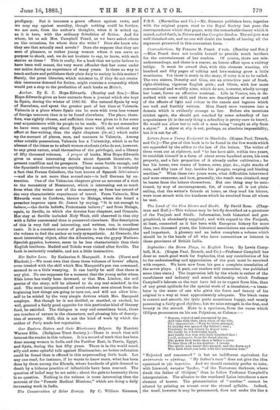Azahar. By E. C. Hope-Edwards. (Bentley and Son.)—Miss Hope-Edwards gives
us here extracts from a journal which she kept in Spain, during the winter of 1881-82. She entered Spain by way of Barcelona, and spent the greater part of her time at Valencia. Valencia is a place where Spain can be seen with even less veneer of foreign manners than is to be found elsewhere. The place, there- fore, was rightly chosen, and sufficient time was given to it for some real acquaintance with its people to be made. We do not remember to have seen anything about Spain more vivid, and without any effort at fulawriting, than the eight chapters (iv.-xi.) which make up the account of places, men, and manners in Valencia. Among other notable possessions, Valencia has a University, which is so far abreast of the times as to admit women students (who do not, however, to any great extent, avail themselves of the privilege), and a library of fifty thousand volumes. A propos of books, Miss Hope-Edwards gives us some interesting details about Spanish literature, its present condition and its prospects. These seem feeble enough, and the Spaniards themselves are anything but sanguine. It is certainly a fact that Fernan Caballero, the best known of Spanish littdrateurs —and she is not more than second-rate—is half German by ex- traction. One of the Valencian chapters gives an account of a visit to the monastery of Montserrat, which is interesting not so much from what the writer saw of the monastery, as from her record of the very characteristic experiences of travel. From Valencia, Miss Edwards went to Cordova, thence to Malaga, where she heard a preacher improve upon St. James by saying, "It is not enough to believe,—the devils beliete, Protestants believe ;" and from Malaga, again, to Seville, to which she devotes four chapters, and Granada. Her stay at Seville included Holy Week, still observed in that city with a fuller ceremonial than is preserved elsewhere. Her description of this is very fall and interesting, and written, too, in excellent taste. It is a constant source of pleasure to the reader throughout the volume to find the author so truly sympathetic. At Granada, the most interesting object, after the Alhambra, was the gypsy Mariano. Spanish gypsies, however, seem to be less characteristic than their English brethren. Madrid and Toledo were visited after Seville. The book is eminently readable, and not a little instructive.


































 Previous page
Previous page